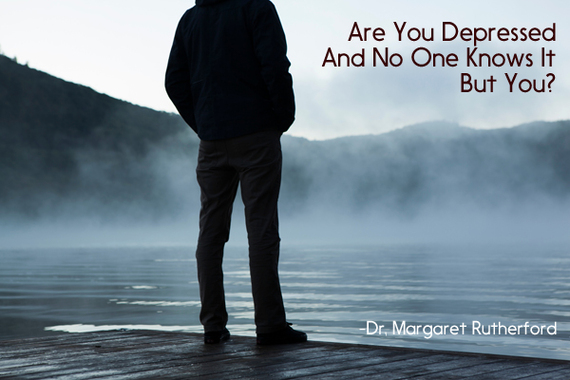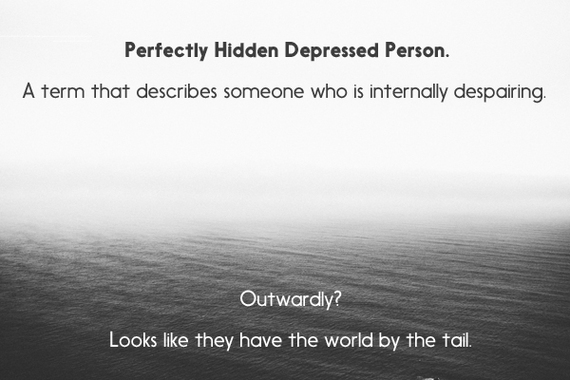She is the young career woman who years ago woke up in a hotel room. Not remembering how she had gotten there. Alone. Half-naked.
Realizing she had been raped.
She never told anyone.
"It's never really bothered me," she tells me now. Smiling.
She makes herself throw up secretly. Sometimes twice a day.
Another is a mother and wife. Impeccably dressed. Very active in the volunteer community.
Everyone loves her. Looks up to her. Relies on her.
Has come into therapy because she doesn't understand why she doesn't want to get out of bed. Now has developed panic attacks. Sudden rushes of adrenaline that overwhelm her and make her want to run out of the room.
She has begun taking a benzodiazepine, Xanax, to cope.
And drinking wine.
Although in her mid-40s, she feels she cannot disappoint her aging parents. She is miserable in her marriage to a highly critical, workaholic husband. Therapy with him didn't help. She has decided divorce is not an option. Her parents... "would be devastated."
I ask her when her depression began.
She looks at me, somewhat surprised.
"Oh, I'm not depressed. I don't cry or anything. I have far too many blessings in my life to be depressed."
He is the man who you can always count on. Always willing to go the extra mile for someone else.
He is a father. A successful lawyer. Divorced and remarried.
Came into therapy because his wife dragged him into couples counseling. Which went well.
Called back months later.
"I'd like to talk to you by myself."
Old hurts have been banished from his psyche. He was sexually and physically abused. Thrown around by a father who had had the same thing done to him. A sister had tragically died right in front of him.
He's just tried to forget.
But he is angry underneath it all.
Who are these folks?
I call each one of them a Perfectly Hidden Depressed Person. A term that describes someone who is internally despairing. Outwardly?
Looks like they have the world by the tail.
How do you change? How do you stop hiding?
First you have to tell someone who you really are, perhaps admit it to yourself for the first time. Then you start the work of challenging the strategies that have kept you in hiding.
1) Abandon the goals of being in total control and/or perfectionism.
Don't get me wrong. These two things are not bad in and of themselves. Feeling in control of yourself is good. Striving for your best. Wonderful
It's when they are taken to the limit that they are harmful. And for most in the PHDP world, making a mistake is not acceptable.
At all.
That has to be looked at carefully. And challenged.
2) Admit the self-destructive ways in which you are handling stress.
You could be escaping your pain in various ways. Alcohol. Prescription medications that are easy to justify. ("My doctor thinks I need these.")
Eating problems or obsessive behaviors are often found. What does that look like? Uber exercising. Obsessing about your weight or what you look like. Intentionally throwing up food. Mopping your kitchen floor three times a day. Worrying.
Constant negative self-definition.
But all of that secret. Hidden. You have to bring that into the open. Admit it. Get some help to change.
Appropriate exercise. Journaling. Meditation. Massage. Laughter. Openness. Allowing yourself to admit vulnerability.
All of these are much healthier pathways to handling stress.
3) Redefine your relationships with other people.
You are always focused on others. In fact, you may even believe that focusing on yourself is "selfish."
Not true.
Realize that you get tired. You get used up. You need support yourself. That's not selfishness.
It's self-awareness.
It's just that the typical PHDP is a much more comfortable "giver" than he is a "receiver." So he creates a world where all he does is give. Give. Give.
That has to change.
The PHDP can learn to say "no." Can learn to reveal what you want. Who you really are.
4) Confront your own avoidance of painful feelings, like anger or shame.
There is frequently something that got all this started. Abuse. A hurtful family dynamic. Maybe now supported by a relationship that mimics that very energy.
Or perhaps you are in a really wonderful relationship. And your partner has no clue just how depressed you are.
It is scary. I have had many people tell me, "It I start talking about what I am sad (or angry) about, the pain will never end. It will suck me under." That's the reasoning behind the PHDP not talking. Hiding.
It's too frightening to emotionally go there.
Or you don't even know how. You have been so shut off from your feelings for so long. "Feeling sad" feels impossible.
It's better to get them out in the open as much as you can. Govern them instead of them governing you.
That original trauma or dynamic that got the hiding started needs to be identified. Talked about. Worked through. Gently and compassionately. That may take some time. Work with a therapist. But it can be done.
5) Realize you have value in and of yourself. Not just in what you DO.
It's simple. You are not what you do.
You are not defined by what you accomplish. How much time you give or money you make. How many committee meetings you attend. How quickly you text people back after they text you.
What you do is important. But it's not everything.
You can sit down. Relax. Breathe.
Sometimes... things can be about you.
Thank you for reading! You can find more from Dr. Margaret: http://drmargaretrutherford.com
Images courtesy Unsplash.
---
Have a story about depression that you'd like to share? Email strongertogether@huffingtonpost.com, or give us a call at (860) 348-3376, and you can record your story in your own words. Please be sure to include your name and phone number.
Need help? In the U.S., call 1-800-273-8255 for the National Suicide Prevention Lifeline.

